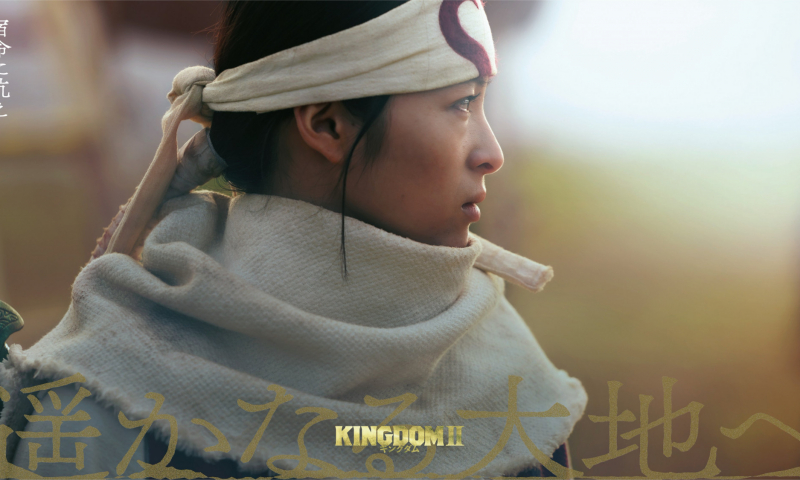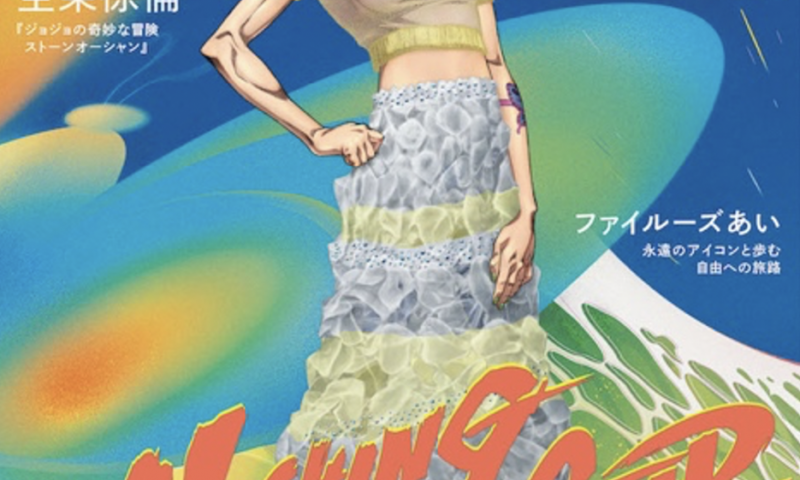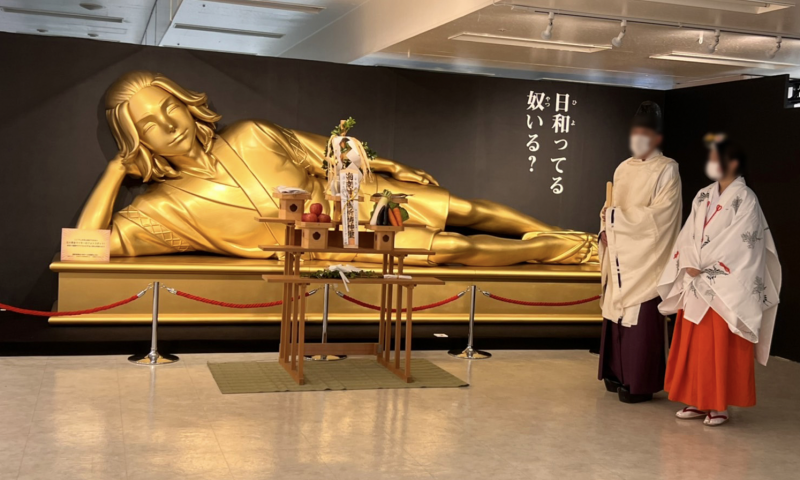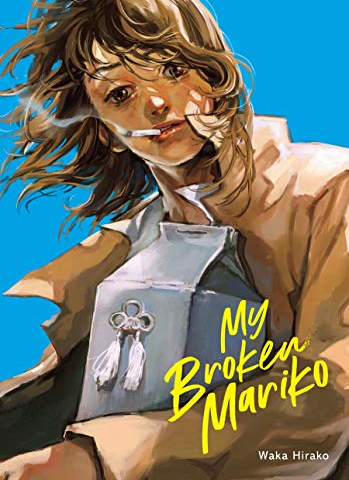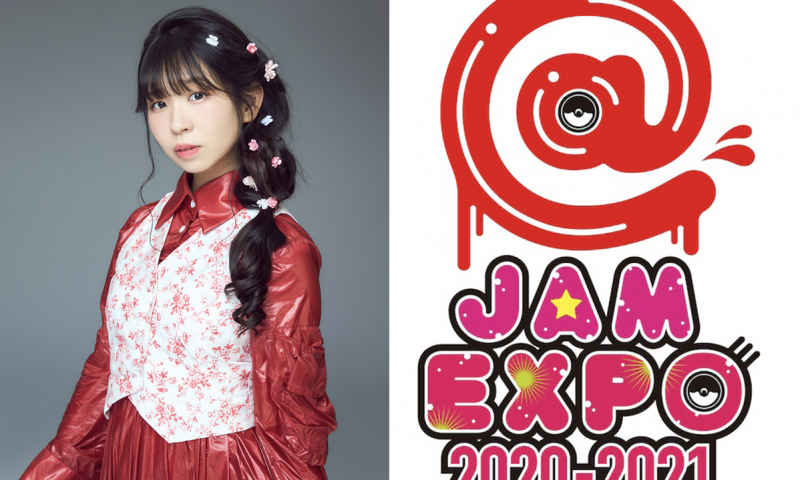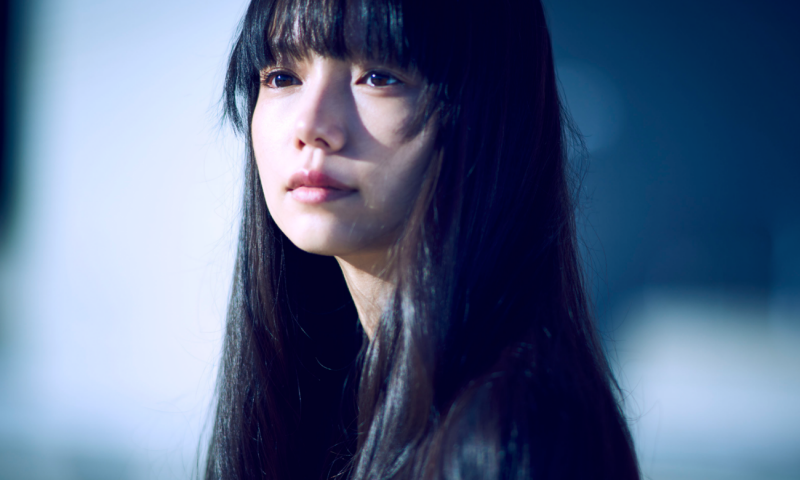
The Evolution from “Actress→Idol” During the Solo Idol Era, and Now “Idol→Actress” During the Current Group Idol Era
ソロアイドル時代は「女優→アイドル」、グループアイドル時代は「アイドル→女優」という大きな変化
Sponsored Links
Whenever I see the headline that an idol is graduating to be an actress, it feels a little strange. That’s because during the 80s and 90s, it was normal for idols to be the lead actresses in dramas and movies, and they would sing the theme songs to these productions.
「アイドルを卒業して女優の道へ進む」という言葉を聞くたびに、個人的にはとても違和感がある。それは、80、90年代は、アイドルがドラマや映画で主演を務める、主題歌を歌う、ということが当たり前の時代だったからだ。
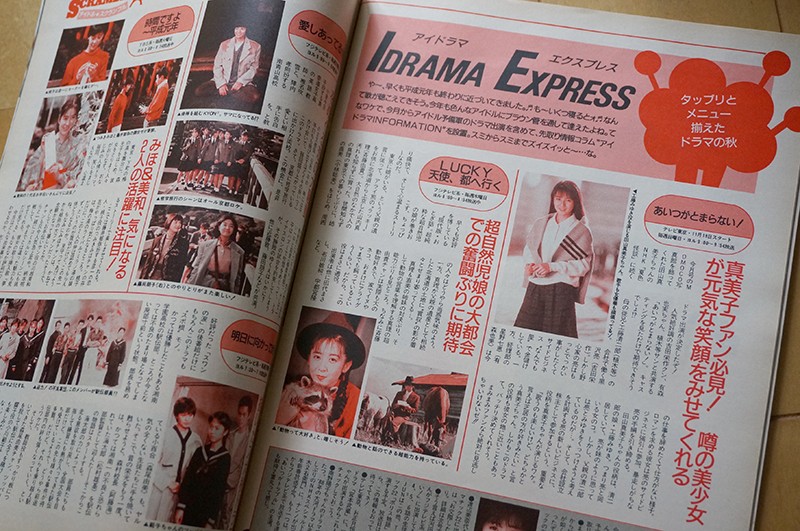
The idol magazine Momoco featured a corner called IDRAMA EXPRESS, that would give information on movies and dramas idols were acting in at the time. (Momoco, December 1989 edition) / アイドル雑誌『Momoco』には、『IDRAMA EXPRESS』というアイドルが出演する映画やドラマの情報を紹介するコーナーが用意されていた(Momoco 1989年12月号)
In the past, it was common for idols to start out as actresses. The process usually went actress→idol. Tsukasa Ito, after gaining popularity from starring in the drama 3-nen B-gumi Kinpachi Sensei, debuted as an idol singer, Seiko Matsuda continued to make a name for herself after appearing in the drama Odaiji ni, Momoko Kikuchi was the lead heroine in the drama Pantsu no Ana well before she made her idol debut, and following the same pattern, Miho Nakayama debuted in the drama Maido Osawagase Shimasu before debuting as an idol singer. Often idols debuted after singing the theme songs a movies would then go on to debut as an idol, like with Tomomi Nishimura who sang the theme to the film Don Matsugoro no Seikatsu.
以前は、女優からスタートするアイドルが多かった。「女優→アイドル」という流れだ。伊藤つかさはドラマ『3年B組金八先生』で人気が出てからのアイドル歌手デビューだし、「松田聖子」は『おだいじに』というドラマに出演した際の役名をそのまま芸名にしたものだし、菊池桃子は映画『パンツの穴』でのヒロイン役がアイドル歌手デビューよりも前だし、中山美穂はドラマ『毎度おさわがせします』でデビューしてから歌手デビューだし──という感じだ。西村知美のように、映画『ドン松五郎の生活』でデビューし、同時に主題歌でアイドル歌手デビューということも見られた。
During that period, there was no end to the number of idols starring in dramas and in film. Many of them starred in works that appeared on Monday Drama Land or the Daiei TV Drama Series. Not only limited to movies and dramas, idols also starred in manga turned into live action works like YAWARA!, Meimon! Tako-nishi Ouendan, Hana no Asuka-gumi, and Sukeban Deka. In the 80s and 90s, idol work and acting generally went hand in hand.
当時、アイドルが主演していたドラマや映画を挙げればきりがない。月曜ドラマランド、大映テレビのドラマシリーズなどは、アイドルが主演を務める作品が多かった。『YAWARA!』『名門!多古西応援団』『花のあすか組!』『スケバン刑事』など、映画やドラマ問わず、漫画を実写化したものはアイドル主演のものが多かったように思う。80、90年代は「アイドルと女優の二足のわらじ」は一般的だったのだ。
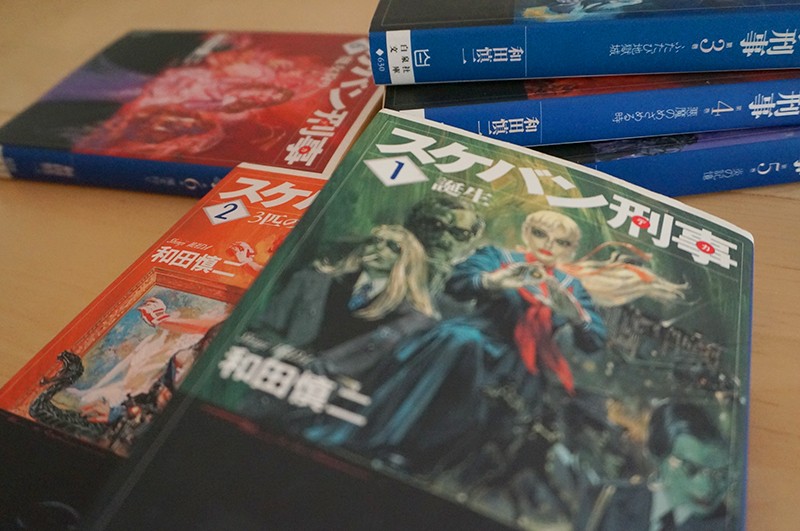
The manga series Sukeban Deka by Shinji Wada (Hakusensha Books). For the television adaptation drama of this series, Yuki Saito played the lead in Sukeban Deka, while Yoko Minamino played the lead in Sukeban Ddeka II, Shojo Tekkamen Densetsu, and Yui Asaka played the lead in Sukeban Deka III, Shojo Ninpocho Denki. Aya Matsuura also starred in the film version of the series. 和田慎二による漫画作品『スケバン刑事』(白泉社文庫)。この作品の実写テレビドラマ化されたものが、斉藤由貴主演の『スケバン刑事』、南野陽子主演の『スケバン刑事II 少女鉄仮面伝説』、浅香唯主演の『スケバン刑事III 少女忍法帖伝奇』だ。スケバン刑事は、そのほか松浦亜弥主演で映画化もされている
However, even in the 80s and 90s, there was the question of who was an idol or who was an actress. Were Hiroko Yakushimaru, Tomoyo Harada, and Noriko Watanabe from Kadokawa 3-nin Musume idols? Was Rie Takahara, who debuted as a singer after doing the insert song for the movie Mangetsu no Kuchizuke an idol? Or was Rie Miyazawa, who was part of the Tetsuya Komuro family and made her screen debut in Bokura no Nanokakan Senso, an idol? I remember debating about it with my friends.
ただ、80、90年代にも、アイドルか女優か問題はあったように思う。薬師丸ひろ子、原田知世、渡辺典子の「角川三人娘」はアイドルなのか? 映画『満月のくちづけ』の挿入歌で歌手デビューした高原里絵(深津絵里)はアイドルなのか? 映画『ぼくらの七日間戦争』でスクリーンデビューしてから小室ファミリーとして歌手デビューした宮沢りえはアイドルなのか? という議論を友人とした記憶がある。
As there has never been a real, clear definition of what an idol is exactly, I could never really had a base to support my argument, and although she would be included in the so-called “singer who debuted as an actress” category. Masami Nagasawa and Yui Aragaki would probably be included in this category, too.
そもそも「アイドルの定義」が明確にされていないので、この議論はまったく着地点を見出せなかったのだが、いわゆる「女優の歌手デビュー組」というカテゴリーだ。今でいうところの長澤まさみや新垣結衣などはここに入るのかもしれない。

“Sailor Fuku to Kikanju” (“Sailor Suit and Machinegun”), from the movie of the same title, was Hiroko Yakushimaru’s debut song. This song was then remade in 2006 by Masami Nagasawa, and then covered again by Kanna Hashimoto when the film was re-made to celebrate Kadokawa Picture’s 40th Anniversary in 2016.『セーラー服と機関銃』は同名の映画の主題歌で薬師丸ひろ子のデビュー曲だ。そしてこの楽曲は、2006年にドラマ版としてリメイクされた際に長澤まさみに、2016年に角川映画40周年記念作品として再度映画化された際に橋本環奈にカバーされた
On a random note, do you know what all of the actresses below have in common?
突然だが、以下の女優の共通点は?
Kaoru Okunuki, Miki Nakatani, Hiromi Nagasaku, Kyoko Fukada, and Aya Ueto
奥貫 薫、中谷美紀、永作博美、深田恭子、上戸 彩
Going by this article’s theme, you might have guessed that they were all idols, but actually all of them were idol group graduates.
今回のテーマからすれば元アイドルというのはわかるだろうが、実は全員グループアイドル出身者だ。
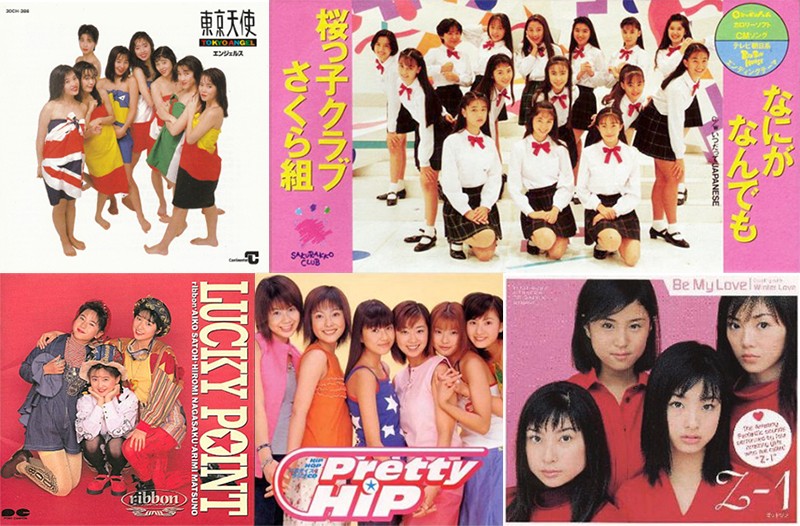
Kaoru Okunuki (Angels), Miki Nakatani (Sakurakko Club), Hiromi Nagasaku (ribbon), Kyoko Fukada (HIP/Hori Idol Paradise), and Aya Ueto (Z-1) / 奥貫 薫(エンジェルス)、中谷美紀(桜っ子クラブ)、永作博美(ribbon)、深田恭子(HiP)、上戸 彩(Z-1)
That’s forgetting the many other women who went from group idol to acting, like Ryoko Shinohara, Yukie Nakama, Miho Kanno, and Miori Takimoto, as most went from idol→actress. That is to say, after graduating from idol work, they would put all of their efforts into becoming full-fledged actresses.
そのほか、篠原涼子、仲間由紀恵、菅野美穂、瀧本美織……と、グループアイドルから女優という流れは多く、そのほとんどが「アイドル→女優」だ。アイドルを卒業してから本格的に女優活動に力を入れて大成した、というもの。これが3つめのカテゴリー。
This the third category, where idols pursue actress work after graduating, and is probably the one you hear about most often now. This category is probably the most recognizable. You might be aware of this idol→actress flow, especially when it comes to group idols that are at the height of their careers.
本コラムの冒頭で記載した「アイドルを卒業して女優の道へ進む」という、最近よく聞かれる言葉は、このカテゴリーのイメージが強いのだろう。特にグループアイドル全盛である現在のアイドルは、「アイドル→女優」という流れを意識していまうのかもしれない。
When it comes to a solo acting career, group activities can sometimes hold them back. In that sense, it can become difficult to pursue both at the time, and by graduating from idol work they might be able to get more acting jobs. Idols like Umika Kawashima from 9nine continued to juggle both for a long period of time, until she announced that she would be graduating from the group at their tour final on July 23, 2016, in order to concentrate solely on acting.
女優としてのソロの仕事は、グループで活動する場合の足かせになることもある。そういう意味で両立は難しく、アイドルを卒業してから女優の仕事が増えていくのはうなずける。9nineの川島海荷などは、長い間アイドルグループ活動をしながら女優活動も続けていたが、女優活動に専念するという理由で2016年7月23日のツアーファイナルにてグループを卒業することを発表している。
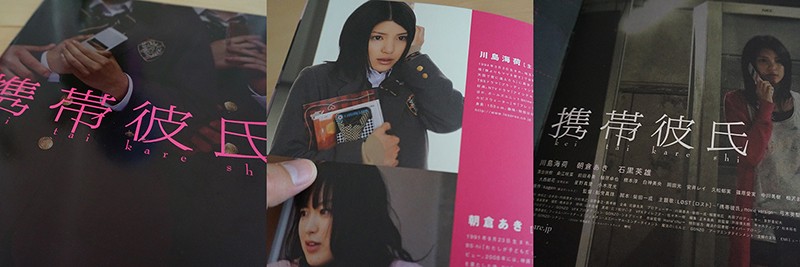
Umika Kawashima joined the older version of 9nine as a second generation member in 2007. From 2010 she worked under the group as a five-member girls performance unit. She starred in her first movie in 2009, called Keitai Kareshi./ 川島海荷は、旧9nineの2期メンバーとして2007年に加入。2010年からは5人組パフォーマンスガールズユニットとして活動してきた。2009年には、映画『携帯彼氏』にて初主演を果たす
From here on out, it’s possible that when idols consider pursuing a solo career over a group one, they’ll turn to the acting path. Currently, however, going from model→actress is still more common. Compared to the 80s and 90s, there’s not as many chances for idols to act in movies and dramas.
これからも、グループよりもソロでの活動を考えた時、女優の道に進みたい、と思うアイドルは増えていくだろう。しかし、今はアイドルよりも「モデル→女優」というのが主流だ。80、90年代のように、映画やドラマにアイドルが出演できるチャンスも少ない。
Meanwhile, represented by Alice in Project, there stage shows centered on idols continue to increase. One of the biggest features of the shows is the opportunity to interact with idols through face-to-face contact, along with pamphlets, candid photos, and item sales, skills that are also useful for idols and their careers. Therefore more people have become bigger fans of idols, so even when they perform as an actress, they can’t help but see these performances as part of the idol image. Of course, it’s fair to say that idols that are live singers and dancers are on a different path.
そんな中、『アリスインプロジェクト』に代表されるように、アイドルを中心に構成される舞台が増えつつある。こうした舞台の最大の特徴は、面会というかたちで接触イベントがあったり、パンフレットや生写真などのグッズ販売があったりと、アイドル活動でのスキルが役立つ場面が多いという点だ。そのため、お客さんはどちらかといえばアイドルのファンが多くなり、女優として演じているというよりも、アイドルのひとつのパフォーマンスの一環として見せているようなイメージはぬぐえない。ただ、歌って踊るライブアイドルとは異なる道として存在することは確かだ。
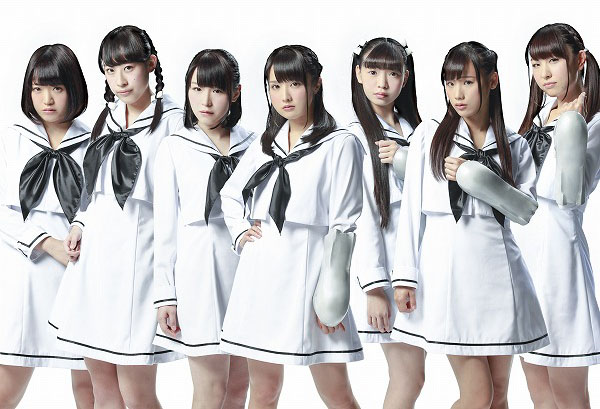
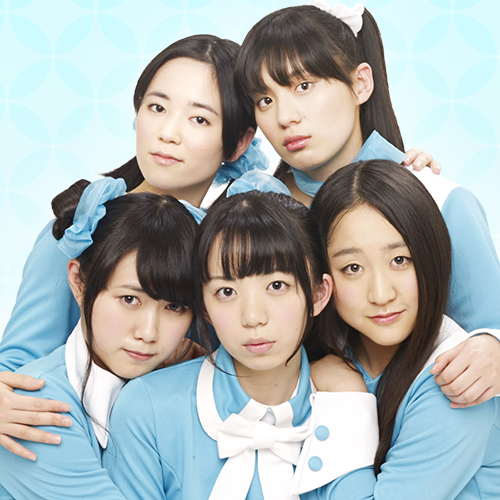
Alice in Project continues to manage a theatrical stage girls unit Alice in Alice (above). Nomakes is a similar idol group featuring actresses, managed by film direct Noboru Iguchi (below).『アリスインプロジェクト』では、舞台女優で構成されたアイドルユニットアリスインアリスのプロデュースも行っている(上)。同様に女優で構成されたアイドルには、映画監督の井口昇がプロデュースを手がけるノーメイクスもある(下)
By digger deeper you’re bound to find more examples of this stage and idol relationship. Minami Aoyama Shojo Kagekidan, which appeared in the 90s, wasn’t an idol group, but a musical/theatrical group made up of girls in their teens. I attended their musical performances for about 10 years. Since 2001 they’ve become inactive, but I think the style of entertainment they created was carried on by Hello!Project.
この舞台とアイドルの関係も、掘り下げるといろいろと見えてくるように思う。’90年に登場した南青山少女歌劇団は、アイドルグループではないが10代の少女だけで構成されたミュージカル集団。約10年にわたって、ミュージカルの公演を行ってきた。2001年より活動休止となっているが、少女が生み出すエンターテインメントという部分ではハロー!プロジェクト(ハロプロ)につながっていくのかなと思っている。
You may think Hello! Project is mainly centered on live concerts, but members from Gekidan Geki Hello, Engeki Joshibu, and Hello!Project have often participated in stage performances. Also, works by them like Stacey’s and LILIUM have garnered huge amounts of praise.
ライブ活動が中心に思われているハロプロだが、劇団ゲキハロや演劇女子部と、ハロプロメンバーが参加する舞台公演はよく行われている。またそれら作品の中には、『ステーシーズ』や『LILIUM-リリウム 少女純潔歌劇-』のように、大きな評価を得ているものも多い。
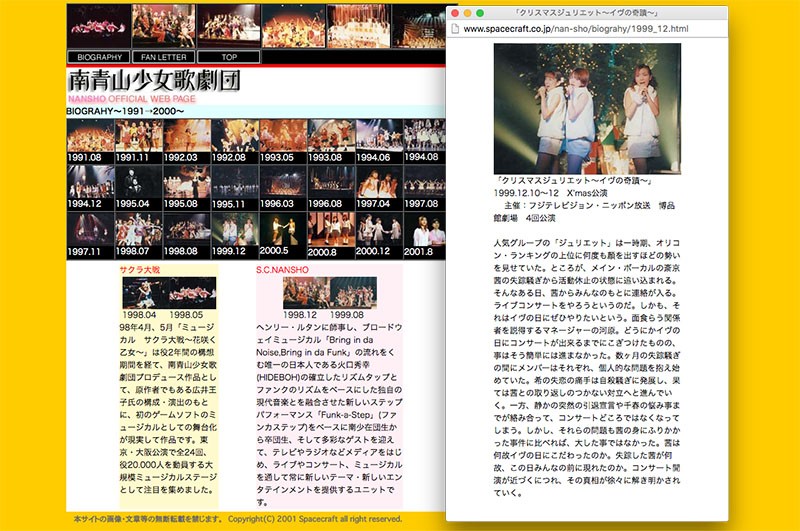
For some reason the official website for Minami Aoyama Shojo Kagekidan remains active. You can still view content on their past performances. / なぜかまだ現存している南青山少女歌劇団のオフィシャルウェブサイト。過去の公演内容などを見ることができる
Minami Aoyama Shojo Kagekidan official site : http://www.spacecraft.co.jp/nan-sho/
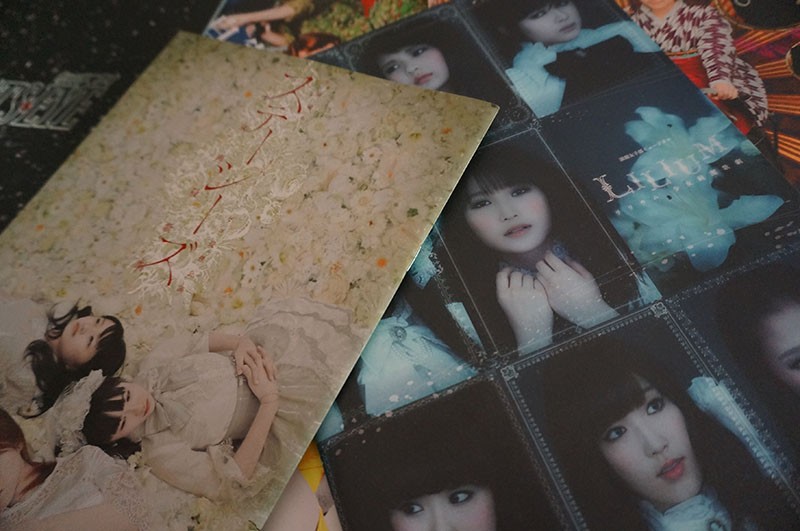
Gekidan Geki Hello started in 2006 as a collaborative project between Hello!Project and Shoengekikai, and finished with their 13th performance in the series, Warera Jeanne ~Shojo Seisen Kageki~ in 2013. From 2014 Upfront Group-affiliated talents became part of a girls-only performing group called Engeki Joshibu. / ハロー!プロジェクトと小演劇界がコラボして2006年からスタートした『劇団ゲキハロ』は、2013年の第13回公演『我らジャンヌ ~少女聖戦歌劇~』でシリーズを終了。2014年からはアップフロントグループ所属タレントが出演する女子だけの公演プロジェクト『演劇女子部』となっている
For example, Hiromi Nagasaku, which I mentioned earlier, was a member of the group ribbon, and by starring in the Gekidan☆Shinkansen play TIMESLIP Oh-gon-maru and by opening herself to theater work, she jumpstarted her life as an actress. Starring in stage productions was encouraged and allowed her to pursue acting.
例えば先に挙げた永作博美は、ribbonメンバーが’93年に主演を務めた劇団☆新感線の舞台『TIMESLIP 黄金丸』で、芝居に目覚めたことにより女優人生がスタートしている。舞台に出演するということが、女優を目指すきっかけにもなり得るということだ。
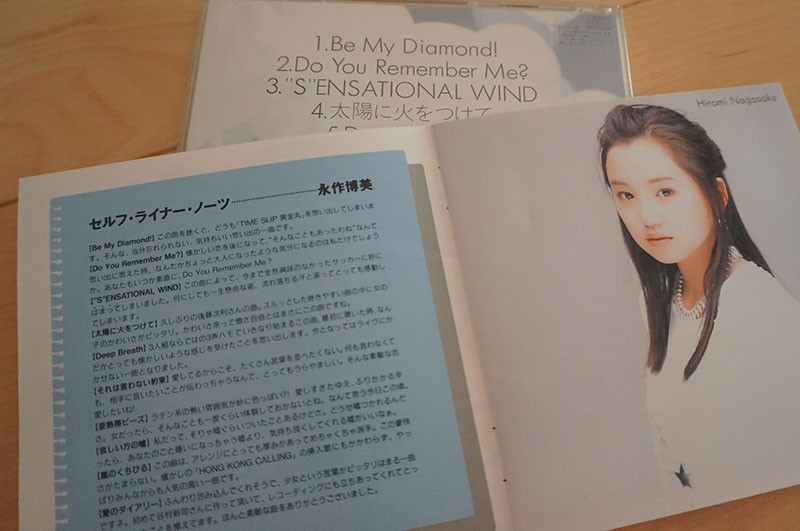
The ribbon song “Be My Diamond” was used as the theme to TIMESLIP Oh-gon-maru. It was included on the album More Delicious ribbon II, and in self-penned liner notes, Hiromi Nagasaku introduces it as a song that reminds her of fond memories of the play./『TIMESLIP 黄金丸』では、ribbonの楽曲『Be My Diamond!』が劇中歌として使われていた。アルバム『More Delicious ribbon Ⅱ』に収録されており、永作博美のセルフ・ライナー・ノーツには「『TIMESLIP 黄金丸』を思い出す」曲として紹介されている
In that sense, idol work has spread beyond just doing concerts, and can lead to big “stage” roles.
そういう意味では、ライブ活動以外にアイドル活動の裾野を広げるうえで、「舞台」というものは重要な役割を持ってくるだろう。
Although I’ve written about the strong tendency during the solo idol era for actress→idol and idol→actress during the group idol era, the foundation for idols being able to pursue acting careers was laid by pioneers in the solo idol era. Kyoko Koizumi (KYON2) is just one of these pioneers, and I’m fond of a comment she made during a Nikkei Entertainment! article, where she states,
ソロアイドル時代は「女優→アイドル」の流れが、グループアイドル時代は「アイドル→女優」の流れが強いと書いたが、アイドルが女優として活動できる土壌を築いたのはソロアイドル時代の先人たちだ。小泉今日子(KYON2)などがそうだが、彼女が『日経エンタテインメント!』の記事の中で話している言葉が僕はとても好きだ。
“I feel that perhaps because of the way they’re always facing new challenges, idols have come to present a model way of living.
「そうやっていつも新しいチャレンジを繰り返してきたからこそ、アイドルとしての生き方の一つのモデルを提示できたのかな、という気もしているんです。
The way Momoe Yamaguchi retired after getting married may be one that women longed for, but that was the only future idols were presented with at the time. Then later, Seiko Matsuda continued idol work after she got married and had a child, but these were the only two models there were. There’s a sense of pride in singing, doing plays, or writing, and showing a completely different model than Momoe’s and Seiko’s.” (Nikkei Entertainment! March 2012 edition)
結婚引退なさった山口百恵さん的な生き方は、女性の憧れではあるけど、当時のアイドルにはそういう未来の姿しか提示されていなかった。その後、松田聖子さんがご結婚、出産されても、アイドルをやり続ける生き方を見せてくれたけど、それでもモデルはその2つだけ。そんななか、歌もやれば、お芝居もするし、書く仕事もしてみるという、百恵さんや聖子さんとはまた全然違うモデルを見せられた自負はあります」(日経エンタテインメント!2012年3月号)
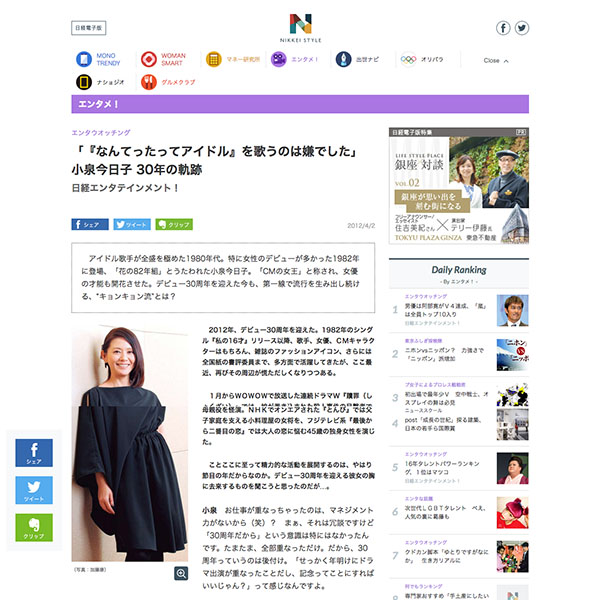
Kyoko Koizumi 30nen no Kiseki (30-year Miracle) – “I really hated singing “Nantettatte Idol”「『なんてったってアイドル』を歌うのは嫌でした」小泉今日子 30年の軌跡
The link to the article : http://style.nikkei.com/article/DGXNASFK2703M_X20C12A3000000
Idols were faced with various challenges, and acting was just one of these. By following this new road, those aforementioned group idols can now open the doors to their own dreams.
アイドルとしてさまざまなことにチャレンジし、そのうちのひとつが女優だったのだ。そして出来上がってきた新たな道をたどることで、先に挙げたようなグループアイドルからの女優たちも夢への扉を開いていった。
With a guidepost like this, what exactly does it mean when headlines say an idol is graduating to pursue an acting career? Surely in the future, a new model will appear besides acting for idols to follow, and the road that idols follow will only continue to widen.
そうした道標があるから「アイドルを卒業して女優の道へ進む」なのだろう。そしてきっとこれから、女優以外の新たなアイドルが目指すべきモデルが登場し、アイドルの進むべき道も広がっていくのだと思う。
※Feature Song: ribbon – “Be My Diamond”
今回の1曲:『Be My Diamond!』ribbon
Read the author’s serialization about “idols’ past and present” more
著者の連載『アイドル温故知新』をさらに読む
http://tokyogirlsupdate.com/author/toshiro-arai
Translated by Jamie Koide
Sponsored Links
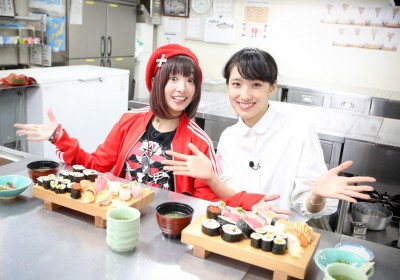
Becoming a Sushi Chef Isn’t a Dream? One Day Sushi Experience at Kiyomura Juku!

Risa Satosaki Reveals Everything in the MV for “S!NG”!


